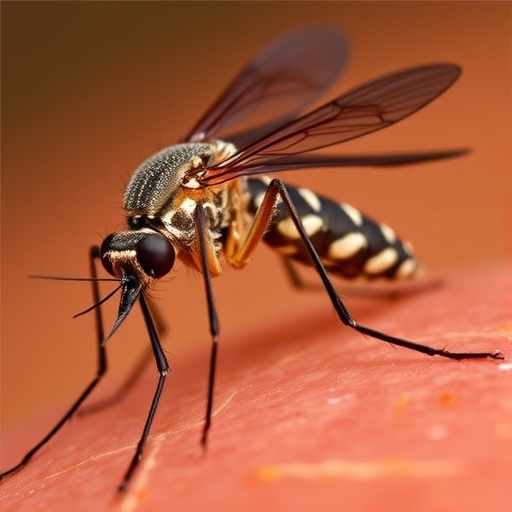Recent advancements in genetics have paved the way for groundbreaking studies, particularly in understanding the intricacies of resistance mechanisms in vectors of infectious diseases. One of the latest contributions in this field is a research article that delves into the role of metabolic resistance genes in the major malaria vector, Anopheles coluzzii. This study, led by Muhammad et al., explores how these genes may confer cross-resistance not only to commonly used insecticides such as pyrethroids but also to environmental pollutants that pose a threat to vector control efforts.
The significance of vector resistance in malaria control cannot be overstated. Mosquitoes, especially species such as Anopheles coluzzii, are central to the transmission of the malaria parasite, Plasmodium, to humans. With increasing reliance on chemical insecticides for vector control, understanding the mechanisms of resistance becomes paramount. The emergence of resistant mosquito populations complicates current efforts, making it necessary to investigate the genetic basis of these adaptations. The research conducted by Muhammad and colleagues thus holds substantial implications for public health and vector management strategies.
In their study, the researchers identified several metabolic resistance genes that are upregulated in Anopheles coluzzii populations exposed to pyrethroids and polycyclic aromatic hydrocarbons (PAHs). These findings indicate that these mosquitoes have evolved genetic adaptations that not only help them survive chemical exposures but may also pose challenges in controlling malaria transmission effectively. The presence of PAHs, common pollutants in various environments, adds an additional layer of complexity, as they could exert selective pressures that shape resistance profiles in mosquito populations.
The research team employed advanced genomic techniques to analyze gene expression patterns. Utilizing RNA sequencing, they were able to elucidate the differential expression of key metabolic resistance genes in response to both pyrethroid and PAH exposures. This sophisticated approach allowed for the identification of specific genes that are likely involved in detoxification processes, shedding light on the mechanisms that enable these mosquitoes to thrive in chemically challenging environments.
One of the standout revelations from the study is the concept of cross-resistance. The implications of cross-resistance extend beyond just the immediate effects of insecticides on mosquito populations. If metabolic pathways are shared between the detoxification of insecticides and other environmental pollutants, this could lead to a scenario where mosquitoes develop resistance to multiple classes of compounds. This potential for co-selection raises concerns regarding the efficacy of current insecticides and highlights the need for developing new vector control strategies that are sustainable and effective over the long term.
The research also emphasizes the importance of considering environmental factors when studying resistance mechanisms in malaria vectors. The presence of various environmental pollutants, combined with the use of pesticides, could create complex interactions that accelerate resistance development. By understanding these interactions, researchers and public health authorities may be better equipped to design integrated control programs that take into account both chemical exposure and environmental pollution.
Furthermore, the study offers insights into potential genetic targets for developing novel insecticides or alternative control measures. By focusing on the specific genes identified in this research, future interventions could potentially disrupt the metabolic pathways that confer resistance, thereby restoring the efficacy of existing insecticides. Such approaches would represent a paradigm shift in vector control, emphasizing the proactive management of resistance rather than reactive measures once resistance has already developed.
As the world faces increasing challenges from vector-borne diseases like malaria, the pursuit of innovative and effective control measures becomes ever more critical. The insights gained from this research not only contribute to the understanding of resistance mechanisms but also lay the groundwork for future explorations into the genetic basis of adaptation in mosquito populations. By harnessing these findings, researchers can inform public health strategies to enhance the effectiveness of malaria control efforts.
In conclusion, the study conducted by Muhammad et al. underscores the urgent need to address the complexities of metabolic resistance in major malaria vectors such as Anopheles coluzzii. By identifying and understanding the role of specific resistance genes, public health officials can develop more effective strategies to combat malaria transmission. The ongoing evolution of mosquito populations in response to various selective pressures necessitates a comprehensive approach that integrates genomics with environmental and chemical considerations. Only through such multidisciplinary efforts can we hope to mitigate the burden of malaria and other vector-borne diseases.
As research continues in this critical area, the findings from this study will undoubtedly serve as a foundation for future investigations. Scientists will be able to build upon this work, further elucidating the genetic landscapes of malaria vectors and paving the way for innovative solutions. The ongoing dialogue between genetic research and practical applications in vector control will be essential in the fight against malaria, ultimately benefiting public health worldwide.
By shedding light on the genetic mechanisms underlying resistance, this research not only increases our understanding of Anopheles coluzzii but also brings us closer to addressing the significant challenge of malaria control in vulnerable populations. As we continue to explore the genetic underpinnings of resistance, it becomes increasingly clear that the fight against vector-borne diseases requires a holistic approach, one that incorporates insights from genetics, ecology, and public health policy.
Subject of Research: Metabolic resistance genes in malaria vectors
Article Title: Investigating the potential role of metabolic resistance genes in conferring cross-resistance to pyrethroids and polycyclic aromatic hydrocarbon pollutants in the major malaria vector Anopheles coluzzii
Article References:
Muhammad, A., Ibrahim, S., Ismail, H. et al. Investigating the potential role of metabolic resistance genes in conferring cross-resistance to pyrethroids and polycyclic aromatic hydrocarbon pollutants in the major malaria vector Anopheles coluzzii.
BMC Genomics 26, 1018 (2025). https://doi.org/10.1186/s12864-025-12229-x
Image Credits: AI Generated
DOI: https://doi.org/10.1186/s12864-025-12229-x
Keywords: Malaria, Anopheles coluzzii, metabolic resistance, pyrethroids, cross-resistance, environmental pollutants, gene expression, vector control, public health, genomic research.




